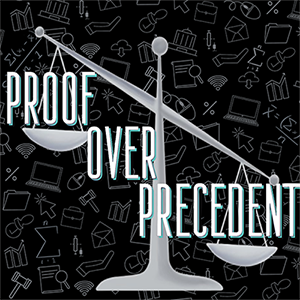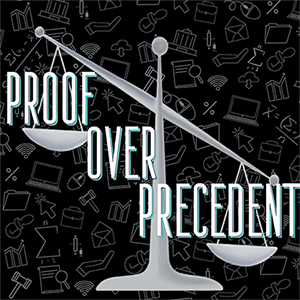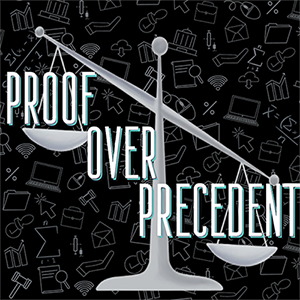Episode Transcript
[00:00:00] Speaker A: Imagine a justice system built on rigorous evidence, not gut instincts or educated guesses about what works and what doesn't.
More people could access the civil justice they deserve.
The criminal justice system could be smaller, more effective, and more humane.
The Access to Justice Lab here at Harvard Law School is producing that needed evidence. And this podcast is about the challenge of transforming law into an evidence based field.
I'm your host, Jim Griner, and this is Proof Over Precedent.
This week we're bringing you a student voice.
[00:00:37] Speaker B: Hello, my name is Spencer. I'm currently a 1L here at HLS and I'm here with Rachel.
Hi.
Okay, so for my Access to Justice post, I looked into different court websites and how people can access information that they need on those websites. So, Rachel, I want you to imagine as if you're trying to get a divorce and look on the United Kingdom website and see just if you type in the word divorce, what would be the first result that you would see?
It says, check. You can get a divorce before you apply, how to apply, what happens after you apply. It's pretty. Seems pretty straightforward, Right? It gives you exactly the information you'd probably be looking for.
[00:01:20] Speaker A: You.
[00:01:20] Speaker B: Yeah. Now I want you to try that again in Washington state.
[00:01:23] Speaker A: Okay.
[00:01:23] Speaker B: Oh, my God. Okay. Why is the Washington State website so bad? Isn't the point of government websites to get me the information I need? Yeah, exactly. I mean, if. If you look up the word divorce, the first result that you're going to get is a scholarly article on post divorce parenting and child well being from the 90s, which, you know, I mean, might be an interesting read, but probably not what you were looking for.
The Washington website.
Yes, it's really bad. And the whole reason that the E Government act of 2002 was passed was to expand accessibility to resources by creating these websites where people could just go online and have their questions answered, have their needs met. But unfortunately, over 20 years later, the government hasn't really kept up with the times. And a lot of cult websites, it's not just Washington state where I'm from, but really almost all of the ones throughout our country are ugly and not easy to navigate.
So why not?
I mean, there's a lot of different potential reasons, but one that Ezra Klein said in a podcast that he did that I thought was quite compelling, was that it can come down to priorities and where the government's going to put its resources. The things that capture media attention are things like policy changes and elections and not really the actual implementation of those policy changes or how, how they affect people. On the ground. So, you know, if there's some sort of law that changes the way that people get divorces or something like that, that's going to get a lot more attention than how people are actually able to access that information and how it works in practice.
But the UK website looks good. Are there any like that in the us?
Yeah, I mean California does stand out among the US court websites. They actually even have a, have created their own template that they use across all of their government websites that of course other states could borrow from as well. And California is a bit of a unicorn in that regard. Most state websites are not that comprehensive, not that user friendly. But yeah, there are some that, that are starting to, to be better.
And what makes the California and UK website so much better?
I mean, at least throughout my research I saw there were three general things that stand out about these good websites as opposed to not so good ones. The first of which is just categorization. The California and UK websites are very easy to navigate because they direct people to the types of resources that they need to access in a very intuitive way. The second is language. They use just more basic language as opposed to a lot of legalese or numbers that don't really make sense, which can be common in a lot of government websites.
And the third is accessibility.
These websites are very easy to see and navigate on your phone as well as your computer and don't require any sort of additional applications which can be the case in a lot of other websites.
Could other websites implement those principles?
Yes, they could. I mean starting out just with the idea of choice, there's this thing called Hick's Law, the Hick Hyman Law. It was developed in the 1950s by psychologists and has been foundational to designing top performing websites specifically in the private sector. But of course it's starting to be implemented in the public sector. A bit late, but, but it is starting to be. The law essentially just says that the amount of time it takes someone to react to something is impacted by the number of stimuli present. So without getting too into the math, if, if you have just a lot of options, it's going to take you more time to make a decision. That's why a of lot, lot of people like Trader Joe's more than other grocery stores. There's just one item there as opposed to 15 different types of flour or whatever it is. And we can see that some websites such as Arkansas and Louisiana really struggle with this. I mean on the Arkansas website, if you want to access any sort of court form, all of them are listed alphabetically and they're not categorized by type of law, like family law, traffic law, tax law, and not even by the types of people who might want to access them. Like the child support work forms and the barcode request forms, which would be something an attorney would be looking for, are listed on one page.
And then in Louisiana, it's a similar system where it's pretty much unorganized list that's alphabetical, 37 website pages long, and the first three of which are Acupuncturist License Application, Acupuncturist License renewer, and Acupuncturist License verification.
Louisiana has almost 5 million residents. Only 81 are licensed acupuncturists. So clearly these are not the most useful forms for the majority of the people that live there.
But there are some potential solutions. I mean, they could implement a search bar at the top. They could implement an AI chatbot or just create some more intuitive categories. You can see on like the UK website, on the California website, they have much more intuitive categories listed that are easy to navigate.
One concern with search bars is you want to make sure that they actually do give you the results that you're looking for. Like we said at the beginning, the Washington state search bar is not all that great in that regard. But if they can just categorize the information in a more easy to navigate way, that can definitely make these websites improve.
That's super interesting. And you also mentioned that the good websites use simple language.
How does the language used by some government websites impact their accessibility?
Right. So to start, most of these websites seem to be designed for government employees or lawyers and not for the general public.
On average, U.S. adults read at the seventh to eighth grade reading level, and 22% don't speak English at home. So the more that these websites can employ basic vocabulary, the better that. That's, that's really not something that happens in practice. I mean, going back to the Arkansas example, the titles of the court forms are really not helpful. I mean, if you want to get a temporary restraining order against somebody in your household who is abusing you, you probably don't have much time to access that information.
And if you check on that website under R for restraining, T for temporary, A for abuse, P for prohibit, O for order, none of those are going to actually bring you to the right form.
The white form is in Latin at the beginning. It's titled Ex parte Order of Protection.
The general population is going to have no idea what that means. And from my standpoint, there's not really a purpose to that. I mean, sometimes there is an argument that having things be in Latin or in fancy language can add sort of a formality to legal proceedings.
I don't totally agree with that as a necessary goal, but especially in this case when you're just trying to get access to the form, just calling it a temporary restraining order would be a lot better. And then it doesn't really get much better at the federal level either. If you want to file for bankruptcy. US federal bankruptcy forms are titled by number, and these numbers are crazy long. One example is B3180v3, followed by a description of their function, something like, for example, periodic report regarding value operations and profitability of entities in which the debtor's estate holds a substantial controlling interest.
That's just a lot of language and not very clear for most people that are looking to file for bankruptcy. Again, we can look to the UK as an example of a model that does this a lot better. Their categories are labeled with really simple language.
Money and tax, childcare and parenting.
It's very easy to understand where you can get the information that you want to get.
And what about accessibility, the third principle that you mentioned? Government websites implement.
Yeah, So I was unable to find any sort of information on what percentage of state or local websites are cell phone friendly. But on the federal level, 41% are not.
And it probably is similar, if not more, at the state and local level. Also, 42% of websites at the federal level are not accessible to users with disabilities, such as visual impairments.
More people own smartphones than computers, 90% versus 81%. And although that 9% difference might sound small, because these websites see over 40 million users a day in total, improving accessibility for that 9% would be significant.
And one of the things is to simply just make things larger. Perfect's Law, which is another principle developed by psychologists in the 50s used to improve digital interfaces, holds that the larger a target is and the closer it is to the information it concerns, the easier it is to click and the more likely you're going to. But on, like the Florida Courts website, for example, a user needs to click a tiny drawing of a PDF that's next to the form number, not the form name itself. It's not very clear that that is the right thing to click. And it would be very easy to just form the title of the form into a hyperlink. To improve accessibility, you just need to click that title, which is what most people would expect. And then in terms of just cell phone usage, California's court forms use large font, minimal words, high contrast, and really easy to navigate on a cell phone. If you look at organ's page on your phone, the language is tiny. You really have to zoom in a lot. Even myself and I don't have any visual impairments. And the sentences run off of the screen. They don't fit onto a cell phone screen.
And we see other problems with New Jersey contrasting with New York where their forms retain their layout when downloading on the cell phone. New Jersey quote forms don't. For some reason, the fonts change and there's multiple fonts on the same form. The lines don't line up. It's not fillable on your cell phone. It really doesn't make sense.
And again, this isn't that difficult of a technical issue to deal with. You know, there's a lot of people who, who want to be fixing websites and it's pretty easy to make them accessible on a cell phone. So that's just another easy way that, that more people could be able to access the information they need.
And do you have any other suggestions about what the government should do?
Yeah, I think at a baseline, just be open to change and prioritizing accessibility of these resources.
Again, maybe it's not the flashiest thing in the media to make a website a bit better, to change the titles that you're using. Those don't make headlines. But it is going to pay off in the long run. I mean, if you have websites that are easier to navigate, people can get the information they need easier. They don't need to waste the court's time or waste just federal or state employees time by contacting them with, with questions that are routine and could easily be answered online.
And also there's just a lot of people who want to be doing this stuff. I mean, we have Code for America. We have just so many people who are interested in improving accessibility on websites and would honestly even do this for free. But even if not doing it for free, I mean, it just is a good, a good investment of government resources because it ensures that language is not just something that, you know, means something in theory, but actually means something in practice. And people get the resources that they need.
Awesome. Thanks so much, Spencer. This is all really interesting. Yeah, thanks so much for talking with me. Bye.
[00:12:54] Speaker A: Proof Over Precedent is a production of the Access to Justice Lab at Harvard Law School.
Views expressed in student podcasts are not necessarily those of the A J Lab.
Thanks for listening. If we piqued your interest, please subscribe wherever you get your podcasts. Even better. Leave us a rating or share an episode with a friend or on social media.
Here's a sneak preview of what we'll bring you next week. When you assign, when you when you produce or when you implement.
Counselor first appearance for the defense what you may do and what we did do and what did happen in these jurisdictions is all of a sudden we got a prosecutor to show up at the hearings at certain times when we didn't have it before, right?
In neither jurisdiction was a prosecutor typically present. At least in one of the jurisdictions, prosecutors made sure to be present when the defense counsel was present. And so you have to be careful about whether you want no lawyers or two lawyers as opposed to just one lawyer, which is what you may think that you're intervening is the nature of your intervention. It's just one lawyer, but that may cause another one to show up.
 Image by Courtney Chrystal, J.D. candidate, Harvard Law School
Image by Courtney Chrystal, J.D. candidate, Harvard Law School

